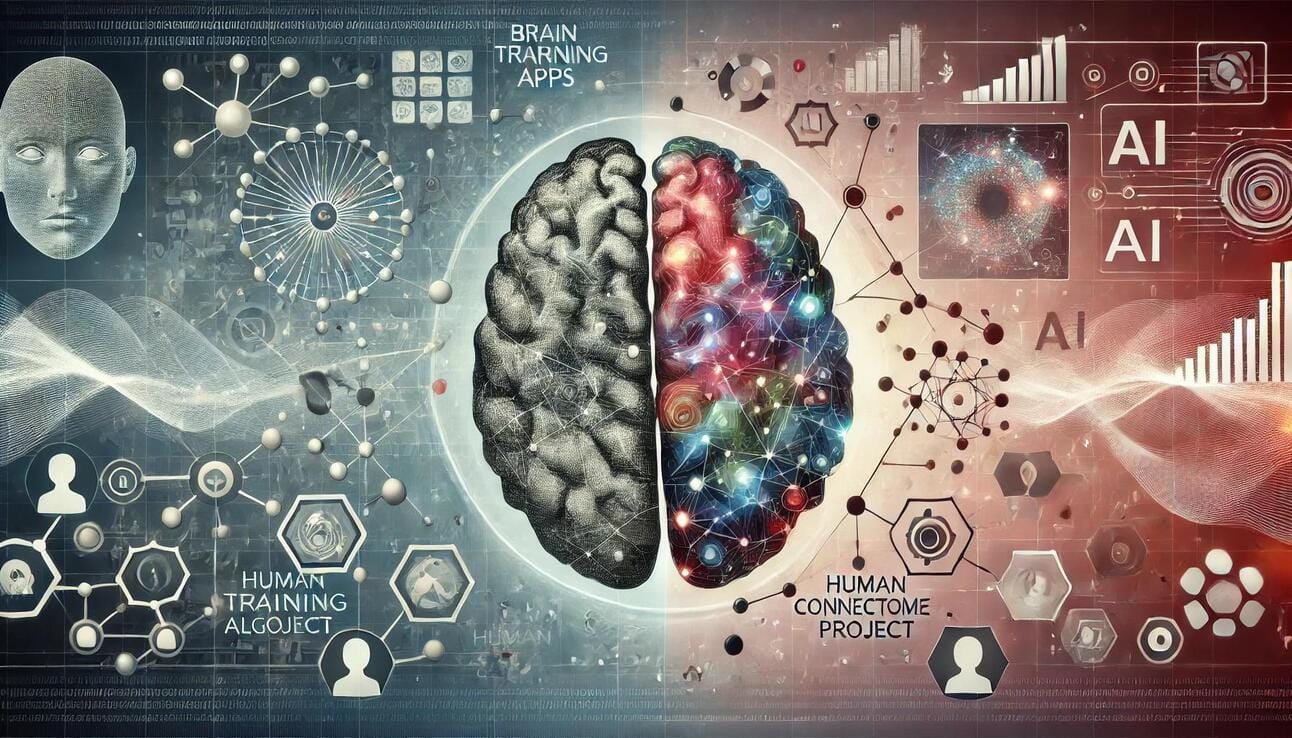At FuturePoint Digital, our core competency lies in building AI-driven applications across a diverse array of industries—ranging from dynamic pricing models based on real-time data to AI-enhanced online learning platforms and sophisticated recruiting and hiring systems. However, at the heart of our mission is a deep commitment to enhancing the human experience. We believe that advancements in artificial intelligence should always prioritize and uplift the human condition. To this end, we integrate insights from the social sciences, neuroscience, ethics, human-computer interaction, and other domains to inform and guide our AI models, ensuring they are designed to support and improve individual and societal well-being.
In this segment, we explore how AI is being leveraged to apply new discoveries in neuroscience to enhance human cognition.
Introduction
Artificial Intelligence is rapidly revolutionizing various fields, and neuroscience is no exception. By leveraging AI, researchers and clinicians are uncovering new ways to enhance cognitive functions, potentially transforming how we understand and improve the human brain. This blog explores how AI can promote cognitive enhancement through neuroscience, with a particular focus on cognitive training and neuroplasticity.
Neuroscience Overview
Neuroscience is the scientific study of the nervous system, encompassing various disciplines such as biology, psychology, and medicine. It aims to understand the structure and function of the brain and nervous system, addressing how they influence behavior and cognitive functions. Key areas include neuroanatomy, neurophysiology, and neurochemistry, which together provide insights into how our brains develop, operate, and adapt (Kandel, Schwartz, & Jessell, 2013).
AI in Cognitive Training and Neuroplasticity
Neuroplasticity refers to the brain's ability to reorganize itself by forming new neural connections throughout life. This adaptive capacity is crucial for learning, memory, and recovery from brain injuries (Kolb & Whishaw, 2015). Recent advances in neuroscience have shown that neuroplasticity is not limited to early developmental stages but continues throughout adulthood, allowing for ongoing cognitive development and adaptation (Holtmaat & Svoboda, 2009). AI is playing a significant role in harnessing neuroplasticity for cognitive enhancement through innovative applications such as cognitive training programs.
These programs, driven by machine learning algorithms, can adapt to individual user performance, providing personalized training that optimizes cognitive functions such as memory, attention, and problem-solving (Klingberg, 2010). For example, AI-based platforms like Lumosity and BrainHQ have demonstrated efficacy in improving cognitive abilities by leveraging neuroplasticity, showing that targeted cognitive exercises can lead to measurable changes in brain function (Hardy et al., 2011; Smith et al., 2009). The integration of AI in cognitive training thus represents a promising frontier in enhancing human cognitive potential through the principles of neuroplasticity.
AI-Driven Cognitive Training Programs
AI-driven brain training programs, like Lumosity and BrainHQ, utilize adaptive algorithms to create personalized training regimens that target specific cognitive functions such as memory, attention, and problem-solving. These programs are designed based on the principles of neuroplasticity, encouraging the brain to form and strengthen neural connections.
Lumosity, for instance, offers a suite of cognitive training games designed to improve various mental abilities. Using adaptive algorithms, it personalizes training regimens based on user performance, continuously analyzing data to adjust difficulty and provide targeted exercises. Studies have shown that regular use of Lumosity can lead to cognitive improvements, with research by Hardy et al. (2011) demonstrating enhancements in visual attention and working memory.
Similarly, BrainHQ, developed by Posit Science, provides a range of brain training exercises focusing on improving cognitive functions like memory and processing speed. BrainHQ utilizes AI to customize training sessions according to individual user progress and needs, ensuring exercises are optimally challenging. The IMPACT study by Smith et al. (2009) reported significant improvements in memory and cognitive speed among users of BrainHQ.
Current Research Projects
Current research projects further exemplify how AI is being leveraged in neuroscience. The Human Connectome Project aims to map the neural connections in the human brain using advanced neuroimaging techniques. Employing machine learning algorithms to analyze vast amounts of neuroimaging data, the project identifies patterns and connections crucial for understanding brain function and structure (Van Essen et al., 2013). Insights from this project can lead to better-targeted cognitive training programs and therapeutic interventions to enhance brain function and neuroplasticity (Glasser et al., 2016). These efforts showcase the significant potential of AI to transform neuroscience research and applications, paving the way for innovative approaches to cognitive enhancement and brain health.
DeepMind's neuroscience research is another prominent example, where the company explores how AI can advance our understanding of the brain's neural networks and cognitive processes. Using deep learning models to simulate and study neural activities, DeepMind aims to develop AI systems that mimic human cognitive abilities (Hassabis et al., 2017). This research could lead to AI-driven tools that enhance learning and memory by aligning with natural brain processes (Botvinick et al., 2019). By leveraging advanced AI techniques, DeepMind's work has the potential to create innovative applications that significantly improve cognitive functions and brain health.
Neurable is developing brain-computer interface (BCI) technology that allows direct communication between the brain and external devices. Integrating AI algorithms to interpret brain signals and translate them into actionable commands, this technology has potential applications in cognitive training, enabling users to control and interact with cognitive enhancement programs using their thoughts (Muller et al., 2017). By leveraging AI, Neurable's BCI technology can offer innovative solutions for cognitive enhancement, making it possible to improve mental functions through direct brain interaction (Kosmyna & Lécuyer, 2017).
The Allen Institute for Brain Science conducts large-scale projects to map brain activity and understand neural dynamics. Utilizing AI and machine learning to analyze neural data, the institute provides insights into brain function and neuroplasticity (Lein et al., 2007). Findings from the Allen Institute can inform the development of AI-driven cognitive training tools and therapies, offering new ways to enhance cognitive functions and treat neurological disorders (Hawrylycz et al., 2016).
Idea in Practice: LeaderMind
LeaderMind is a fictional example of an innovative AI-powered platform designed to elevate leadership and organizational behavior skills through personalized, adaptive training experiences. Harnessing the power of advanced AI algorithms, LeaderMind offers a comprehensive suite of tools that cater to the unique needs of each user, ensuring that every training module is not only relevant but also highly effective. By conducting an initial assessment to evaluate current skill levels, LeaderMind creates tailored training programs that focus on critical areas such as communication, decision-making, emotional intelligence, and conflict resolution. As users progress, the platform continuously adapts, offering dynamic feedback and adjusting content to maintain an optimal level of challenge and engagement.
At the heart of LeaderMind is its interactive simulation environment, where users can engage in AI-driven role-playing scenarios that mirror real-world leadership challenges. These simulations, combined with real-time AI coaching, provide a safe space for users to practice and refine their skills. Additionally, LeaderMind fosters collaborative learning through peer interaction and mentorship matching, leveraging AI to ensure productive and goal-oriented engagements. With comprehensive progress reports and organizational analytics, LeaderMind not only tracks individual development but also offers valuable insights to organizations, helping them to identify trends and tailor their training initiatives. By integrating gamification elements such as achievement badges and leaderboards, LeaderMind motivates users to continually improve, making the journey to becoming an exceptional leader both engaging and rewarding.
Conclusion
The integration of AI in neuroscience is already yielding promising results in enhancing cognitive functions and promoting neuroplasticity. Through personalized and adaptive cognitive training programs, as well as cutting-edge research projects, AI is helping to unlock new potential in understanding and improving the human brain. These examples and ongoing projects highlight the transformative impact of AI on neuroscience, paving the way for significant advancements in cognitive enhancement.
Call to Action
At FuturePoint Digital, we're passionate about creating AI solutions that enhance the human experience. Do you have an innovative idea for an AI app that can make a difference? We'd love to hear from you! Contact us today to discuss how we can collaborate on practical AI app development to support personal growth and well-being. Let's turn your vision into reality together!

About the Author: David Ragland is a former senior technology executive and an adjunct professor of management. He serves as a partner at FuturePoint Digital, a research-based AI consultancy specializing in strategy, advisory & educational services, as well as custom AI application development. David earned his Doctorate in Business Administration from IE University in Madrid, Spain, and a Master of Science in Information and Telecommunications Systems from Johns Hopkins University. He also holds an undergraduate degree in Psychology from James Madison University and completed a certificate in Artificial Intelligence and Business Strategy at MIT. His research focuses on the intersection of artificial intelligence with organizational and societal dynamics.
References
Hardy, J. L., Drescher, D., Sarkar, K., Kellett, G., & Scanlon, M. (2011). Enhancing visual attention and working memory with a web-based cognitive training program. Journal of the American Geriatrics Society, 59(12), 2408-2411.
Kandel, E. R., Schwartz, J. H., & Jessell, T. M. (2013). Principles of Neural Science (5th ed.). McGraw-Hill Education.
Smith, G. E., Housen, P., Yaffe, K., Ruff, R., Kennison, R. F., Mahncke, H. W., & Zelinski, E. M. (2009). A cognitive training program based on principles of brain plasticity: results from the Improvement in Memory with Plasticity-based Adaptive Cognitive Training (IMPACT) study. Journal of the American Geriatrics Society, 57(4), 594-603.
Hardy, J. L., Drescher, D., Sarkar, K., Kellett, G., & Scanlon, M. (2011). Enhancing visual attention and working memory with a web-based cognitive training program. Journal of the American Geriatrics Society, 59(12), 2408-2411.
Holtmaat, A., & Svoboda, K. (2009). Experience-dependent structural synaptic plasticity in the mammalian brain. Nature Reviews Neuroscience, 10(9), 647-658.
Klingberg, T. (2010). Training and plasticity of working memory. Trends in Cognitive Sciences, 14(7), 317-324.
Kolb, B., & Whishaw, I. Q. (2015). An Introduction to Brain and Behavior (4th ed.). Worth Publishers.
Smith, G. E., Housen, P., Yaffe, K., Ruff, R., Kennison, R. F., Mahncke, H. W., & Zelinski, E. M. (2009). A cognitive training program based on principles of brain plasticity: results from the Improvement in Memory with Plasticity-based Adaptive Cognitive Training (IMPACT) study. Journal of the American Geriatrics Society, 57(4), 594-603.
Glasser, M. F., Coalson, T. S., Robinson, E. C., Hacker, C. D., Harwell, J., Yacoub, E., ... & Van Essen, D. C. (2016). A multi-modal parcellation of human cerebral cortex. Nature, 536(7615), 171-178.
Van Essen, D. C., Smith, S. M., Barch, D. M., Behrens, T. E., Yacoub, E., Ugurbil, K., & WU-Minn HCP Consortium. (2013). The WU-Minn Human Connectome Project: an overview. NeuroImage, 80, 62-79.
Botvinick, M., Ritter, S., Wang, J. X., Kurth-Nelson, Z., Blundell, C., & Hassabis, D. (2019). Reinforcement learning, fast and slow. Trends in Cognitive Sciences, 23(5), 408-422.
Hassabis, D., Kumaran, D., Summerfield, C., & Botvinick, M. (2017). Neuroscience-inspired artificial intelligence. Neuron, 95(2), 245-258.
Kosmyna, N., & Lécuyer, A. (2017). Designing guiding systems for brain computer interfaces. Frontiers in Human Neuroscience, 11, 369.
Muller, L., Hamilton, L. S., Edwards, E., Bouchard, K. E., & Chang, E. F. (2017). Spatial resolution dependence on spectral frequency in human speech cortex electrocorticography. Journal of Neural Engineering, 14(5), 056005.
Hawrylycz, M. J., Lein, E. S., Guillozet-Bongaarts, A. L., Shen, E. H., Ng, L., Miller, J. A., ... & Jones, A. R. (2016). Inferring cortical function in the mouse visual system through large-scale systems neuroscience. Proceedings of the National Academy of Sciences, 113(27), 7337-7344.
Lein, E. S., Hawrylycz, M. J., Ao, N., Ayres, M., Bensinger, A., Bernard, A., ... & Jones, A. R. (2007). Genome-wide atlas of gene expression in the adult mouse brain. Nature, 445(7124), 168-176.
Hashtags:
#ArtificialIntelligence #MachineLearning #DeepLearning #AI #DataScience #BigData #Robotics #NLP (Natural Language Processing) #ComputerVision #AIResearch #TechTrends #AIethics #AIinnovation #FutureOfWork #Automation #SmartTechnology #IoT #DigitalTransformation #AIApplications #AIInBusiness
#SocialSciences #Sociology #Psychology #Anthropology #PoliticalScience #Economics #CulturalStudies #BehavioralScience #SocialResearch #PublicHealth
#Business #Entrepreneurship #Marketing #Management #Finance #Startups #Leadership #BusinessStrategy #Innovation #Sustainability
#Humanities #History #Philosophy #Literature #ArtHistory #CulturalStudies #Linguistics #Classics #Theology #Ethics

